Emergency Dentist Perth
- Home
- Emergency Dentist Perth

Emergency dental care in perth
Affordable Emergency Dentists in Perth
No one is prepared to face a dental emergency. Because it happens unexpectedly, it can be distressing and cause anxiety. That’s why having the contact of an experienced emergency dentist in Perth is essential. Here at Acts Dental, we are dedicated to providing our patients with prompt and compassionate care and are ready to address any dental emergency they may face.
Whether you are suffering from a toothache that will not go away, have a cracked or broken tooth, or have any other dental emergency, you can count on us to book a last-minute visit to your emergency dentist in Perth and offer the relief and peace of mind you deserve.
If you’re experiencing a dental emergency, please call us on 08 9474 5083 or Book online 24/7. For after-hours dentist Perth assistance, you can reach us at 0415 199 080 – we're here to help you when you need us most.
What is a Dental Emergency
Any situation requiring a dentist’s urgent care and attention to relieve pain and discomfort, save a tooth, or stop tissue bleeding can be considered a dental emergency. People may experience dental emergencies, from severe toothache to dental injuries. In a dental emergency, seek immediate care from an emergency dentist Perth to prevent further complications. Dental emergencies can cause stress or anxiety and may lead to more significant problems or infections if they aren’t treated quickly.
The Prevalence and Impact of Emergency Dental Care
Dental emergencies may happen to of all ages worldwide. It is important to seek treatment promptly, not just to ease the pain but also to avoid long-term dental problems. For example, if you go to your dentist to reimplant a knocked-out tooth within an hour, you have a good chance of saving your tooth, and if you act promptly on a tooth abscess, you can stop the infection from spreading. These examples show the importance of getting quick, effective treatment to protect your dental health and avoid more serious problems.
How does an appointment with an Emergency Dentists in Perth work
An emergency dentist specialises in addressing sudden, urgent dental problems without a prior appointment. Whether you’re dealing with a severe toothache, an abscess, or an unexpected dental injury, an emergency dentist can provide quick relief, control infection, perform necessary emergency procedures, and make sure you’re comfortable again.

Common Dental Emergencies and Their Causes
Severe Toothache
While toothache often begins as mild discomfort, it can quickly become severe pain that needs urgent care. That’s why promptly visiting your dentist is crucial when tooth pain starts. Wisdom tooth pain is a common cause of severe dental pain resulting from an impacted or infected wisdom tooth that may require tooth extraction. If your pain isn’t going away even after trying home remedies, it’s important to schedule an emergency appointment with your emergency dentist in Perth for quick relief.
The Root of the Pain: Understanding Toothache Causes
While problematic wisdom teeth are often the cause of severe toothaches, there are plenty of other reasons why your teeth may hurt.
Cavities are a common cause of dental pain and occur when tooth decay penetrates the enamel and reaches the sensitive layer underneath, called dentin. If cavities are left untreated, the infection can spread to the nerve and lead to serious pain.
Another common cause of tooth pain is a dental abscess. It happens when bacteria infect the tooth’s root or between the gum and a tooth. Dental abscesses can cause a lot of pain; if not treated, the infection can spread to other parts of the body.
Gum disease may also cause tooth pain. It starts as gingivitis, which is a mild form of the condition, and if it is not treated, it can progress to a more serious stage called periodontitis. As the disease progresses, it affects the underlying bone and can cause teeth to become loose, adding to discomfort and pain.
A Stitch in Time: Preventative Measures for Toothache
Taking good care of your teeth is essential to avoid severe toothache. Brushing twice a day with fluoride toothpaste and flossing every day can help prevent cavities and gum disease. Adding mouthwash to your routine can also help get rid of some of the harmful bacteria. Scheduling a visit to see your dentist every six months is a great way to catch any problems early and before they turn into big, painful issues. Plus, your dentist can provide you with a good professional cleaning to remove plaque and tartar buildup, which helps keep cavities and gum disease away.
Diet plays a crucial role in dental health. When you cut down on sugary snacks and acidic drinks, you lower your chances of getting cavities and damaging your enamel. Plus, eating foods that are rich in vitamins and minerals helps keep your teeth and gums healthy.
Easing the Pain: Treatment Options for Severe Toothache
Sometimes, even with all our preventive measures, a toothache can still happen! But don’t worry; there are several ways to ease dental pain, depending on what’s causing it, until you can visit your dentist.
For cavities
Dental fillings are the most common treatment; they repair the cavity and get rid of the pain. If decay has reached the tooth’s pulp, root canal therapy may be necessary to remove infected tissue and save the tooth.
For dental abscesses:
Your dentist usually starts with draining the abscess to remove pus and reduce infection. Sometimes, your dentist may need to perform root canal treatment. If the infection is severe, your dentist may have to extract the tooth to stop the infection from spreading.
For gum disease:
The treatment for gum disease depends on how serious it is. Your dentist may perform a deep cleaning procedure to remove plaque and tartar below the gum line. In advanced cases, your dentist may need to perform surgery to restore the supportive tissues around your teeth.
If deep cleaning isn’t enough, there are other treatments your dentist can try. One of the procedures your dentist may decide to perform is flap surgery or pocket reduction surgery.
In this procedure, the periodontist makes small cuts in the gums to lift them and thoroughly clean the roots. When the roots are cleaned, the gums are stitched back in place to help make the pockets smaller and easier to keep clean.
This surgery helps stop gum disease from getting worse and helps the gums to reattach to the teeth, reducing space for harmful bacteria to grow.
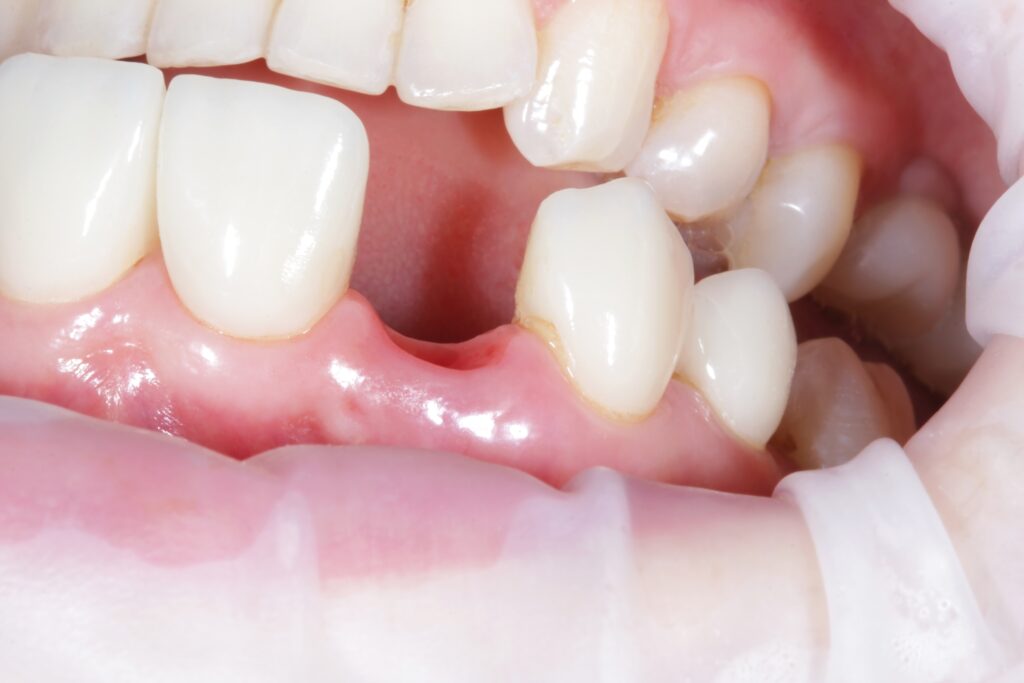
Knocked-Out Teeth
A knocked-out tooth is a serious dental emergency that needs immediate attention from your dentist. Whether it’s from an accident or a sports injury, you should contact your emergency dentist Perth immediately. Acting quickly can help save your tooth and prevent further complications.
First Response: Immediate Actions for a Knocked-Out Tooth
When a tooth is knocked out, the first few minutes are critical for increasing the chances of saving it.
Follow these steps carefully:
Pick Up the Tooth by the Crown: Hold the tooth by its crown (the part visible in the mouth), not the root. Touching the root can damage cells needed to reattach it to the bone.
Rinse, Don’t Scrub: If the tooth is dirty, gently rinse it with milk or saline solution. Don’t use tap water because the chlorine in it can damage the cells on the root. Do not scrub the tooth or remove any attached tissue fragments that are still attached.
Try to Reinsert the Tooth: If it is possible, try to put the tooth back in its socket. Bite down gently on some medical gauze or a soft cloth to hold it in place. If you cannot reinsert the tooth, go to the next step.
Keep the Tooth Moist: If you can, put the tooth in a container with milk, saline, or a tooth preservation product if you have one. If you don’t have any of those, keep the tooth in your mouth next to your cheek to keep it moist. Don’t store it in water.
Seek Immediate Dental Care: Time is of the essence. Ideally, the tooth should be reimplanted within an hour of being knocked out. Contact an emergency dentist immediately and bring the preserved tooth with you.
Time is really important here: The best chance to save the tooth is if it’s put back within an hour. Call an emergency dentist immediately and take the preserved tooth with you.
The Race Against Time: Long-Term Implications of a Knocked-Out Tooth
Acting quickly when a tooth gets knocked out is really important. If you act quickly and put the tooth back in place, you have a better chance of saving it. This means you can keep your natural smile and avoid procedures like dental implants or dental bridges. Generally, the longer your tooth stays out, the harder it may get to be reattached because the root cells can get damaged and won’t stick back to the bone. Acting quickly can also help avoid more significant problems like jawbone deterioration at the site of the missing tooth, misalignment of the other teeth, or even trouble with speaking and chewing.
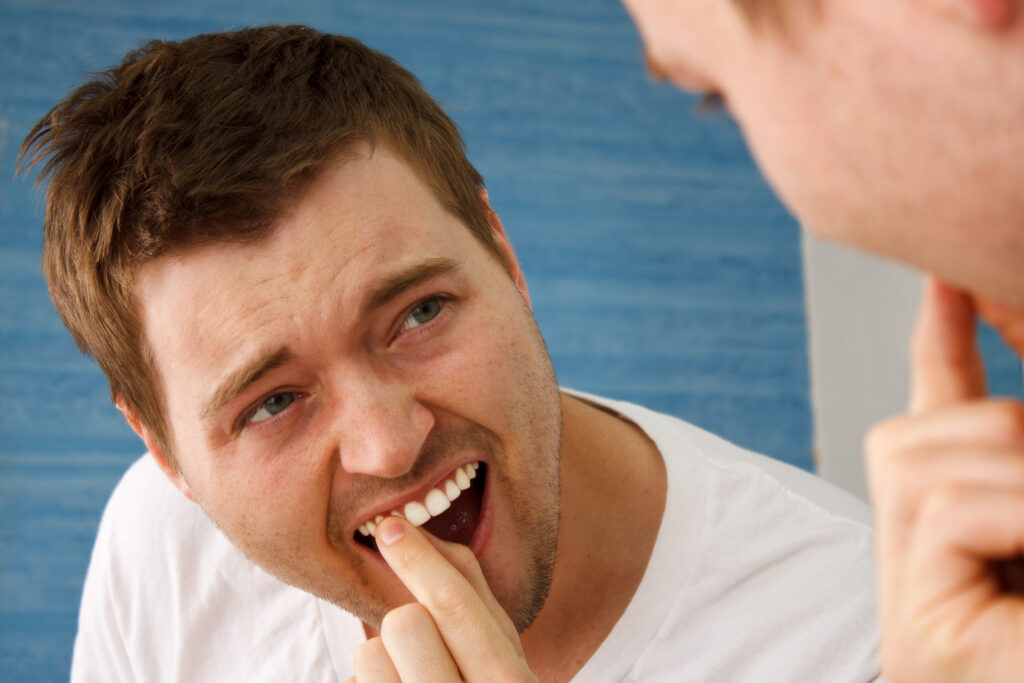
Loose Tooth
If you are an adult and you have a loose tooth, you need to see an emergency dentist as soon as possible to prevent potential tooth loss. While loose teeth are normal in children, they can be a sign of injury or dental issues in adults.
Digging Deeper: Underlying Causes of a Loose Tooth
A tooth may become loose for several reasons, from acute injuries to chronic conditions:
Periodontal Disease: Advanced gum disease may be the main reason why you, as an adult, may experience a loose tooth. Gum disease is an infection of the gums that, if not addressed promptly, can damage the bone that holds your teeth in place. As it progresses, it creates pockets around the teeth, which can lead to bone and tissue loss and eventually can make the teeth loose.
Trauma or Injury: If you have a sudden hit or blow to your mouth, it can cause your teeth to become loose immediately. Even habits like grinding or clenching your teeth can, over time, wear down the bone and lead to loose teeth.
Osteoporosis: It is a condition that weakens bones and affects the strength and density of the jawbone, which can make teeth become loose.
Other Conditions: Some health conditions, like diabetes, may affect the gums and tissues around teeth and make them more likely to become loose.
In the Meantime: Handling a Loose Tooth at Home
There are a few things you can do to take care of a loose tooth and avoid making it worse until you can see an emergency dentist.
Practice Gentle Oral Hygiene: Brush and floss carefully around the loose tooth, but be careful not to brush or floss too hard, as this could make things worse.
Limit Movement: Try not to touch or wiggle the loose tooth with your fingers or tongue because this could make it even looser or cause it to fall out.
Soft Diet: Try to eat soft foods to reduce pressure on the loose tooth. Stay away from anything hard, crunchy, or sticky, as these may pull the tooth or cause more damage.
Pain Management: If the loose tooth hurts, you can take over-the-counter pain relievers to ease the pain. Putting a cold compress on your cheek can also help with the discomfort.
Avoid DIY Treatments: Avoid trying home remedies or adjusting yourself because you may worsen things. It’s best to wait to see a dental professional to fix the issue. Your dentist may recommend different treatments depending on what has caused your tooth to become loose. They may perform deep cleaning procedures to address gum disease, use splinting to keep the tooth stable, or recommend other options.
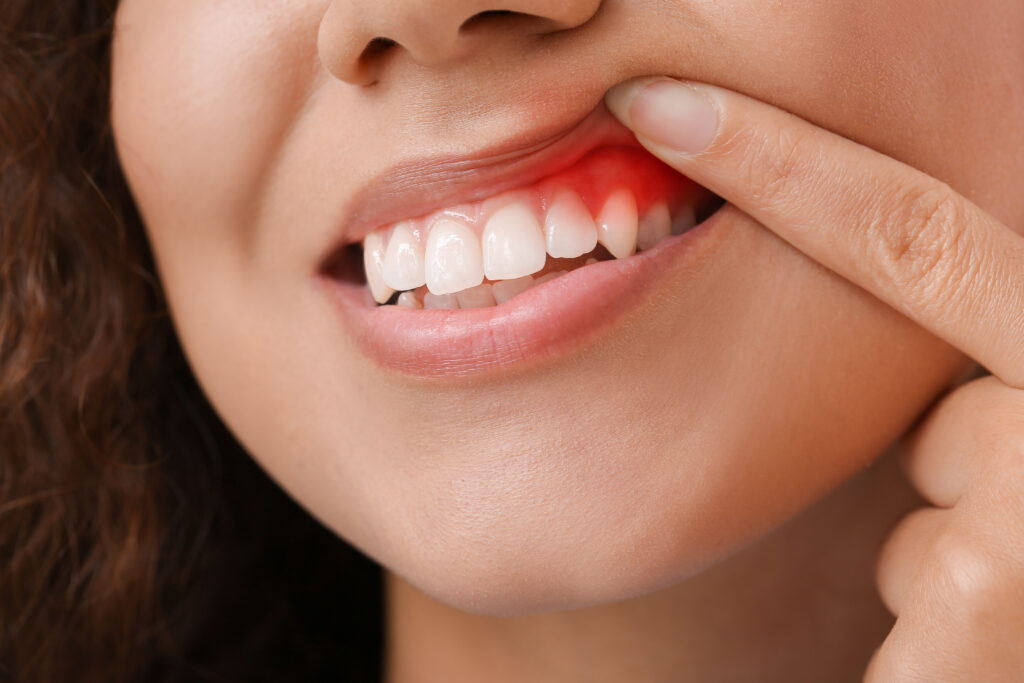
Swelling, Redness, or Bleeding Gums
If you have swollen or bleeding gums, you need to see a dentist as soon as possible. This may be a sign of problems like gum abscess or gum disease. If not addressed promptly, swollen or bleeding gums can get worse and lead to serious oral health problems. See an emergency dentist in Perth to get the right treatment and prevent problems from getting worse.
Understanding Gum Diseases: Gingivitis to Periodontitis
Gum disease, also called periodontal disease, is common but can be prevented with proper care. It usually starts as gingivitis, which causes red, swollen, and bleeding gums, often due to plaque buildup along the gumline.
Gingivitis can be reversed with good oral hygiene and professional dental care. If gingivitis is not treated, it can turn into periodontitis, a more severe form of gum disease that damages the bones and tissues that support your teeth. This can lead to pockets between the gums and teeth where harmful bacteria grow. These pockets can get deeper and cause bone and tissue loss, loose teeth, and even tooth loss over time.
Gum disease affects more than just your mouth. According to some studies, there may be a link between gum disease and health problems like heart disease, diabetes, respiratory disease, and pregnancy complications.
Gentle Care for Troubled Gums: Home Care Tips
It is essential that you seek professional dental care to diagnose and treat gum disease, but there are things you can do at home to help ease symptoms and keep your gums healthy.
Rinse with Saltwater: A saltwater rinse may help calm swollen gums and reduce bacteria. Mix a teaspoon of salt into a cup of warm water, swish it gently in your mouth for 30 seconds, then spit it out.
Use an Antimicrobial Mouthwash: Over-the-counter antimicrobial mouthwashes can reduce bacteria and plaque that cause gum disease. They may also help reduce gum inflammation and bleeding.
Stay Hydrated: Drink plenty of water to keep your mouth clean and increase saliva production, which helps protect against gum disease.
Avoid Irritants: Try to cut back on sugary foods, drinks, and tobacco since they can make gum disease worse.
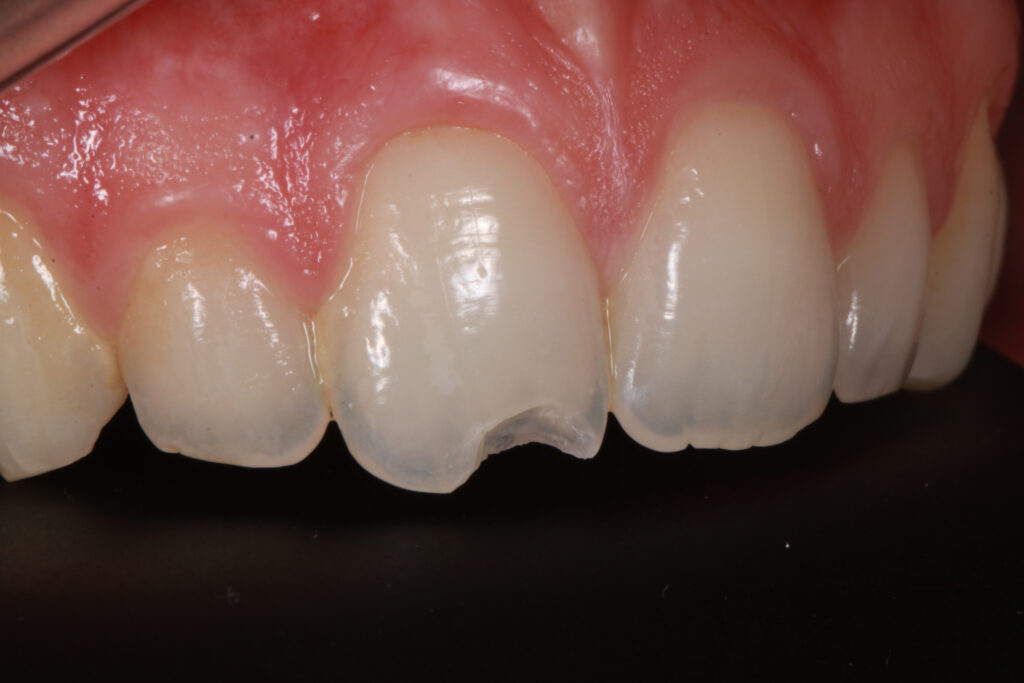
Broken, Cracked, or Chipped Tooth
Teeth can chip or crack from incidents like biting down on something hard or a facial injury. A chipped or cracked tooth or a broken tooth can cause a lot of pain and lead to more damage if left untreated. If you notice any form of damage to your teeth, contact an emergency dentist immediately. Your dentist will assess how serious the damage is and decide on the best treatment.
Navigating Through the Cracks: Severity Levels and Treatments
The treatment for a broken, cracked, or chipped tooth largely depends on the severity of the damage:
Minor Chips: If the chip or crack is small and has not damaged your tooth’s structure too much, your dentist can usually smooth it out or repair it with a simple filling or bonding. These treatments are quick and painless and help make the tooth look normal again.
Moderate Cracks and Chips: If a larger part of the tooth is damaged but the pulp isn’t affected, your dentist may go for treatments like veneers or crowns. These treatments help restore the tooth’s appearance and protect it from further damage.
Severe Fractures: If the crack reaches the tooth’s pulp, you may need a root canal to remove the damaged pulp and prevent infection. After that, a crown is usually placed over the tooth to restore the tooth’s look and function. If the tooth is badly broken and cannot be saved, the dentist may need to extract it. If you have to have the tooth extracted, you have options like dental implants or bridges to replace it.
Holding the Fort: Protective Measures Until You See an Emergency Dentist Perth
It is important to act quickly to protect your mouth after a tooth is chipped, cracked, or broken because this can help prevent further problems.
Rinse Your Mouth: Gently rinse the area with warm water. If the damage is due to an injury, put a cold compress on your cheek to help with swelling.
Temporary Pain Relief: If you are in pain, you can take over-the-counter painkillers, but do not put them directly on your gums or tooth because they can cause burns.
Cover Sharp Edges: If the broken tooth has sharp edges, you can cover them with wax paraffin or sugar-free gum to prevent them from cutting your cheek, tongue, or lips.
Eat with Care: If you need to eat before you see a dentist, try to eat soft foods and avoid chewing with the damaged tooth.
Avoid Extreme Temperatures: A cracked or broken tooth can be sensitive to hot and cold, so try to avoid very hot or cold foods. Stick to foods and beverages that are at room temperature to minimise discomfort.
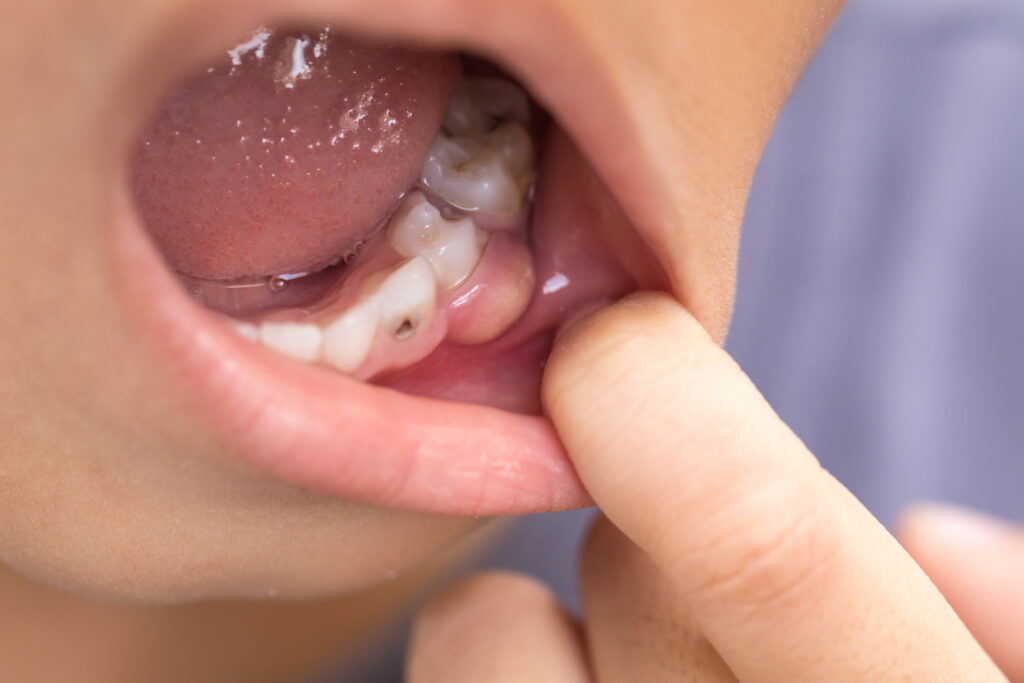
Dental Abscess
A dental abscess is a common dental emergency. It happens when an infection causes a pocket of pus to form in the tooth or gums, leading to severe pain. It’s important to see an emergency dentist in Perth as soon as possible because a dental abscess can be life-threatening in some cases.
Unveiling the Abscess: Signs and Symptoms
It’s important to recognise the signs and symptoms of a dental abscess so that you can get treatment quickly. Some of the symptoms are:
Severe, Persistent Toothache: You may experience a throbbing, sharp, or shooting pain that can even spread to your jaw, neck, or ear.
Sensitivity to Temperature: You may notice that your teeth have become more sensitive to hot and cold foods and drinks.
Sensitivity to Pressure: Experiencing pain when you chew something or bite down on something.
Fever: You may notice that you have a high fever because your body is fighting off the abscess infection.
Swelling in the Face or Cheek: Swelling in your face or cheek could mean the infection is spreading.
Swollen, Tender Lymph Nodes: You may notice swollen, tender lymph nodes, especially under your jaw or in your neck, as a response to the infection.
A Foul Taste in the Mouth: You may feel a bad taste in your mouth if pus is leaking from the abscess.
Bad Breath: You may also have persistent and noticeable bad breath because of the infection.
Beyond the Abscess: Potential Complications
If a dental abscess isn’t treated, it can lead to serious and even life-threatening complications.
Spread of Infection: The infection can spread to your jaw, other parts of your head and neck, or even further in your body. In serious cases, it can cause sepsis, which is a life-threatening reaction to an infection.
Loss of the Affected Tooth: If the infection isn’t treated, your dentist may have to extract the tooth to prevent it from spreading.
Ludwig’s Angina: It is an infection that spreads under the jaw and the floor of the mouth and causes swelling that can make it hard to breathe.
Cavernous Sinus Thrombosis: It is a rare but serious condition where the infection spreads to your brain through the blood vessels.
Osteomyelitis: It is an infection in the bones of your jaw or face. It’s important that you seek prompt treatment and see an emergency dentist in Perth right away to avoid these complications. Dentists will usually drain the abscess, prescribe antibiotics to clear the infection, and then address the underlying issue by either performing a root canal or extracting the tooth.
Infections and Oral Pain
Oral infections can be really painful and make it difficult for you to eat, talk, or even sleep. They can spread from one tooth to other teeth, so getting emergency dental care immediately is important. If the pain is too much to tolerate and it’s after regular hours, you should consider seeing an after-hour emergency Perth dentist. You can rinse your mouth with warm salt water for temporary relief, but make sure you visit your dentist as soon as possible for professional dental care.
Common Types of Oral Infections
There are different forms of oral infections, each of which may cause severe pain and require a specific type of treatment.
Dental Caries (Tooth Decay): Tooth decay happens when bacteria in your mouth turn sugars from the foods you eat into acid, which causes dental cavities. Without treatment, cavities can lead to pain and infection.
Periodontal Disease: A severe type of gum disease that affects both the gums and the bone that holds your teeth in place and causes pain, swelling, and sometimes even tooth loss.
Dental Abscesses: As previously discussed, abscesses are pockets of pus that form because of a bacterial infection and lead to a lot of pain and swelling.
Pulpitis: Inflammation in the dental pulp usually happens because of untreated cavities or injury, and it can cause a throbbing pain.
Osteomyelitis: It is an infection in the bone that can happen in the jawbone around an infected tooth or after advanced gum disease.
Cellulitis: It is a bacterial infection that can affect the soft tissues in your mouth and lead to pain, redness, swelling, and trouble opening your mouth.
The Critical Path to Emergency Care
Make sure you get emergency dental care as soon as you notice signs of an infection.
Preventing Spread: Seeking professional dental care to treat an infection is crucial to prevent it from spreading and causing more serious health issues.
Alleviating Pain: Visiting an emergency dentist Perth is beneficial because they can relieve pain effectively by using medication, draining abscesses, or performing other treatments.
Saving Teeth: When you seek prompt treatment for infections, you can often save teeth that may otherwise need to be removed.
Comprehensive Treatment Options: Depending on the severity of the infection, an emergency dentist may perform different treatments. They may give you antibiotics to fight the infection, drain an abscess, perform root canal therapy, or remove the tooth if it cannot be saved.
Injury to the Jaw
An injury to the jaw may happen from a fall, a sports accident, or a hard hit or blow. If it’s a severe jaw injury, you should go to the emergency room right away. For minor injuries, it’s a good idea to see an emergency dentist in Perth for a check-up to make sure there is no serious damage to your teeth and jawbone.
Navigating Jaw Injuries: From Minor to Severe
Jaw injuries can range from mild to severe, and each one needs a different kind of treatment.
Minor Injuries: Minor jaw injuries, like small fractures or dislocations, usually do not affect jaw alignment much or cause serious pain. Your dentist may ask you to follow a soft or liquid diet to avoid too much jaw movement, take over-the-counter pain relievers, and apply cold compresses to reduce swelling.
Moderate Injuries: Moderate jaw injuries, like partial dislocations, bigger fractures, or issues that affect teeth alignment, require more care. Your dentist may use a dental splint to keep your jaw in place, prescribe pain medication to relieve pain, and recommend a soft or liquid diet to help with healing.
Severe Injuries: Severe jaw injuries can include complete fractures, multiple breaks, or dislocations that seriously affect the structure and function of the jaw. In these cases, your dentist or oral surgeon may need to do surgery to realign the jawbone for proper healing. Sometimes, they may even need to wire your jaw shut to keep it still while it heals.
Emergency Room (ER) vs. Dentist: Making the Right Choice
Deciding whether to go to the emergency room or see your dentist is important for properly handling a jaw injury.
Visit the ER if:
The pain is severe, and over-the-counter medications are not helping.
You think your jaw is broken or there are multiple fractures.
You’re having trouble breathing or swallowing, which could mean a serious injury affecting your airways or causing major swelling.
The jaw injury happened along with other serious injuries that need urgent care.
See a Dentist if:
The injury is just to your jaw or teeth without severe pain or major dislocation.
You are mainly worried about damaged teeth or minor dislocations that aren’t affecting your breathing or swallowing.
The injury seems minor or moderate, and you are not sure about its seriousness. A dentist who is experienced in oral injuries can evaluate it and refer you to the ER if needed.
Uncontrolled Bleeding
Bleeding from the mouth that will not stop can be really scary. The first thing to do is try to stop the bleeding by applying pressure with a clean cloth. If the bleeding does not stop, you should seek help from an emergency dentist. They can manage the situation and stop the bleeding quickly.
Tracing the Source: Causes and First Aid
Uncontrolled bleeding from your mouth can happen for different reasons:
Trauma to the Mouth: Accidents, sports injuries, or biting down hard on food can lead to cuts on your gums, tongue, or cheeks. First Aid: Rinse your mouth with cold water to clean it, then press a clean, damp cloth or gauze on the bleeding spot for 10 to 15 minutes. You can also use ice to help reduce swelling and stop the bleeding.
Post-Dental Procedures: Tooth extractions, dental implants, or other surgical procedures can cause some bleeding afterwards. First Aid: Bite down on a gauze pad over the bleeding spot for 30 to 60 minutes. Try not to spit, use a straw, or drink hot beverages because these can make the bleeding worse.
Gum Disease: Advanced gum disease can make your gums tender and sore and cause them to bleed easily. First Aid: Rinse your mouth gently with salt water, and avoid brushing or flossing that area until you can see your dentist.
Broken Teeth or Lost Fillings: Sharp edges from a broken tooth or lost fillings can cut the tongue and inner cheeks. First Aid: Try to cover the sharp edge with sugar-free gum or dental wax, and try not to touch it with your tongue.
Dentist to the Rescue: Professional Interventions
After you visit your emergency dentist, they will diagnose the underlying cause of your ongoing oral bleeding and use different methods to fix the problem.
Assessment and Cleaning: The dentist will start by finding where the bleeding is coming from and cleaning the area to avoid infection.
Suturing: For deep cuts or lacerations, your dentist may need to use stitches to close the wound and stop the bleeding.
Medication: When bleeding is caused by gum disease or happens after surgery, your dentist may give you antibiotics to stop the infection and medicated mouthwash to help with healing.
Restorative Treatment: For broken teeth or lost fillings, your dentist will repair the tooth with fillings, crowns, or dental bonding and smooth out any sharp edges to prevent more damage.
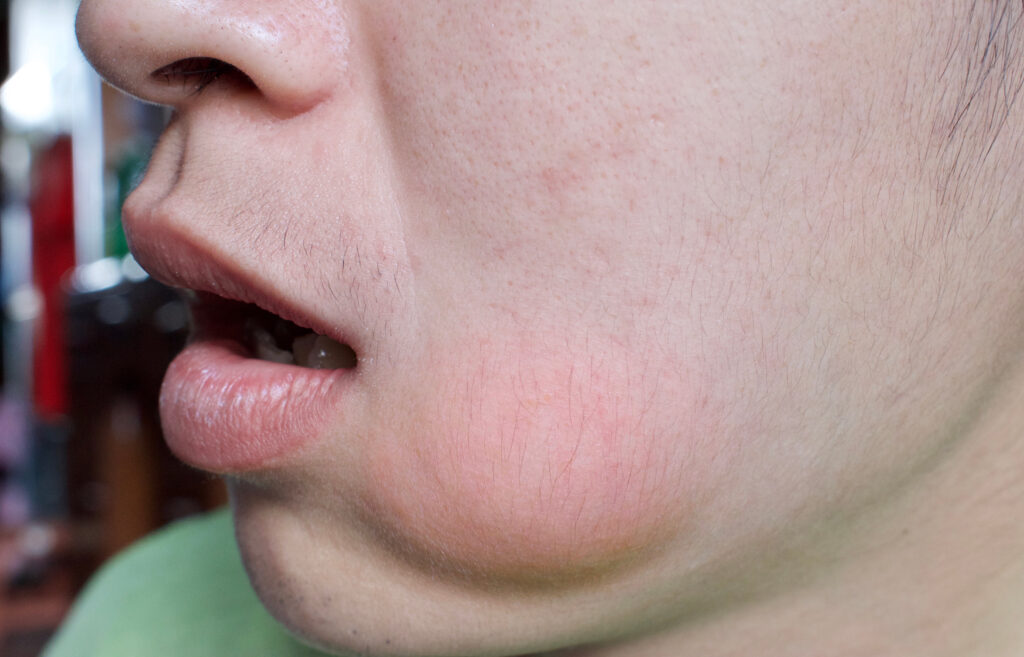
Swelling in the Mouth or Facial Area
Swelling in your mouth or face can be a sign of a serious dental issue and should not be neglected. It may be due to an infection, injury, or complications from dental work. You can use a cold compress or ice pack to reduce the swelling temporarily, but if it doesn’t go away, it’s important to see a dentist right away. Emergency Dentist Perth CBD can find the cause and treat it properly.
Unraveling the Swell: Causes of Oral and Facial Swelling
Swelling in your mouth or face can happen for different reasons:
Dental Abscesses: A tooth or gum abscess can cause a lot of swelling. The buildup of pus from the infection causes swelling and pain.
Allergic Reactions: If you have allergies to medications, foods, or dental materials, your mouth and face may become swollen, and you may also experience itching and redness. Severe reactions, like anaphylaxis, need immediate medical attention.
Trauma: Injuries from falls, sports, or accidents can lead to swelling because of internal bleeding and tissue damage.
Infections: In addition to abscesses, viral, bacterial, or fungal infections can also cause swelling. Serious conditions like cellulitis or jawbone infections (osteomyelitis) can lead to significant facial swelling.
Post-Surgical Swelling: Swelling is normal after dental procedures like tooth extractions or dental implants. It is part of the body’s natural healing process and will improve with the right care.
First Response: Immediate Actions and Treatments
If you have swelling in your mouth or face, the following steps can help until you can book an emergency dentist appointment:
Cold Compress: Place a cold compress or ice pack on the outside of your face to help numb the area, reduce swelling, and relieve pain. Don’t put it directly on your skin; wrap the ice in a cloth and then place it on your face.
Elevation: Keep your head elevated, even when you are sleeping, to help reduce swelling.
Avoid Heat: Avoid hot foods, drinks, and heat packs because heat can increase blood flow and make swelling worse.
Salt Water Rinse: If you have swelling inside your mouth, gently rinsing with warm salt water can help calm the area and reduce bacteria.
Medications: You can take over-the-counter anti-inflammatory medications to reduce swelling and pain, but check with your emergency dentist South Perth if you’re not sure about using them.
Professional Treatment
Antibiotics: If the swelling is due to an infection, your dentist may prescribe antibiotics to get rid of it.
Drainage: If the swelling is from an abscess, the dentist may need to drain the pus to eliminate the infection and reduce the swelling.
Allergy Management: To manage allergic reactions, your dentist may prescribe antihistamines or other allergy medications. You may also need to avoid the allergen in the future.
Surgery: For serious injuries or certain infections like osteomyelitis, surgery may be needed to repair the damage or remove infected tissue.
Follow-Up Care: After treatment, your dentist will give you instructions about keeping your mouth clean, changes to your diet, and follow-up visits to check on healing.
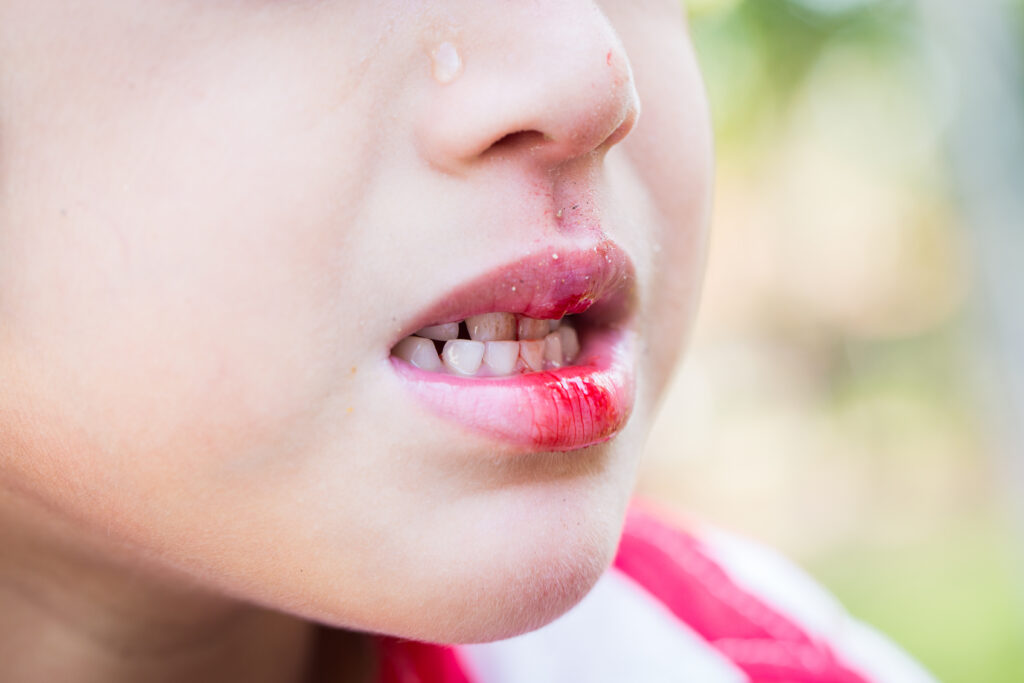
Soft Tissue Injuries: Requires Immediate Care from an Emergency Dentist Perth
Soft tissue injuries in the mouth, like those to the gums, cheeks, lips, and tongue, can happen from incidents like accidental bites, falls, sports injuries, or eating. These injuries can range from small cuts to more serious wounds that need professional treatment. Make sure you visit your dentist to receive immediate care, which is important for stopping bleeding, reducing the risk of infection, and helping with the healing process.
Root Causes and Initial Response
Injury Mechanisms: Soft tissue injuries can result from accidents during daily activities, sports, or eating. They can vary in severity and require different treatments.
Immediate Care Strategies: You can start by applying pressure to stop the bleeding, using a cold compress to reduce swelling, and gently cleaning the wound to provide relief and prevent infection.
Professional Intervention
If you have a serious injury, it’s important to get medical or dental help right away. Your dentist or doctor can stitch the wound, give you antibiotics to prevent or treat infection and guide you on how to take care of it so it heals well.
You can reduce the risk of mouth injuries by wearing a mouthguard during sports and being cautious when eating.
Paediatric Dental Emergencies
Children, just like adults, can also face dental emergencies. Paediatric dentists are experts in handling these emergencies, whether it’s a knocked-out baby tooth or an infection. It’s important to see a pediatric dentist quickly because children’s teeth and jaws are still developing. If your child has a dental emergency, it’s best to see a pediatric dentist who knows how to handle these delicate situations.
Common Emergencies in Children
Kids are more likely to have certain dental emergencies, typically because of their active lifestyle.
Knocked-Out Teeth: It is not uncommon for children to knock out a tooth, whether from a fall or a sports injury, especially their baby teeth.
Dental Decay and Abscesses: Children are more likely to get dental decay and cavities because they don’t always brush their teeth well and eat a lot of sugary foods and snacks. If left untreated, these cavities can lead to painful abscesses.
Toothaches: Your child may feel a lot of discomfort from something as simple as food stuck between their teeth or from new teeth coming in.
Soft Tissue Injuries: Your child may accidentally bite their lip or tongue while playing, which can cause cuts and bleeding.

Preventative Tips for Parents From an Emergency Dentist Perth
Parents and caregivers can avoid dental emergencies by taking a few simple steps at home.
Regular Dental Check-ups: Arrange a dental checkup with a paediatric dentist for your child every six months.
Oral Hygiene: Teach your child why it is necessary to brush their teeth twice a day with fluoride toothpaste and floss to remove food particles.
Healthy Diet: Try to reduce their intake of sugary snacks and drinks to lower the risk of cavities and tooth decay.
Protective Gear: Make sure your child wears a mouthguard during sports or active play to protect their teeth against damage and prevent tooth loss.
Childproofing the Home: Try to childproof your house to reduce the risk of falls or bumps that could harm your child’s teeth or mouth.
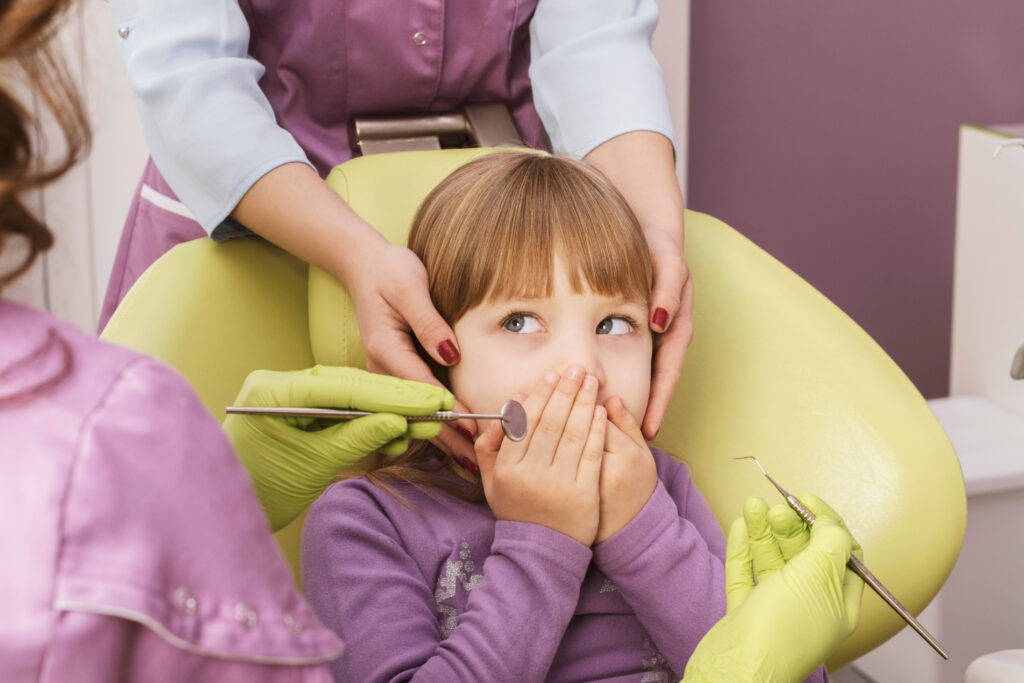
Dealing with Anxiety
Dental visits can be stressful for both children and parents. Here are ways to reduce anxiety:
Positive Reinforcement: It is important that you speak positively about the dentist and avoid negative words. Explain why dental health is important in simple language that your child can understand.
Role Play: Play “dentist” at home to help your child get comfortable with what happens during a dental visit.
Choose the Right Dentist: Look for a paediatric dentist who has experience with kids and makes the office a welcoming, child-friendly place.
Stay Calm: Kids can sense when their parents are anxious. Staying calm and supportive can help them feel less scared.
Distractions: You can bring your child’s favourite toy or book to keep them busy while waiting.
Billing & Fees for Emergency Dental Appointments
An After-Hours Callout Fee (Item 915) of $150 applies to after-hours emergency visits if you do not have private health insurance. If you are insured, your out-of-pocket cost will depend on your level of cover and rebate. This fee covers the cost of making our team available outside normal hours, while any treatment provided will be billed separately according to the procedures required.
Your Emergency Dentist Perth: A Local Guide
Located in Perth South of the River and servicing South Perth, Como, Kensington and Victoria Park, Acts Dental is your trusted local dentist for all dental emergencies. Plus, we are the preferred dental provider with Bupa, Medibank, HBF, HCF, and NIB to ensure that you receive full benefits when receiving your emergency treatment. Call us at 08 9474 5083, or book online 24/7. For after-hours assistance, you can reach us at 0415 199 080 – we’re here to help you when you need us most.

